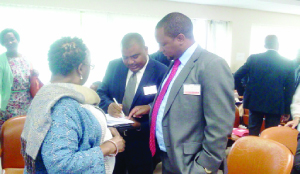
•COMMERCE, Trade and Industry Deputy Minister, Miles Sampa (right) chats with ministry senior economist in industry department, Amos Mumba and Zambia National Farmers Union deputy executive director, Ellah Chembe during the official opening of the African, Caribbean and Pacific (ACP) Council of ministers meeting in
Brussels yesterday. Picture by JAMES MUYANWA
By JAMES MUYANWA –
in Brussels, BELGIUM
THE countries in the African, Caribbean and Pacific (ACP) grouping have been urged to take advantage of the region’s comparative advantage and develop their economies.
ACP Council of Ministers president Sato Kilman said here that countries from the ACP regions have what it takes to compete favourably with other regions economically.
Mr Kilman, who is Vanuatu Foreign Affairs minister, said this during the official opening of the 101st session of the ACP Council of Ministers at ACP House.
Zambia was being represented by a delegation led by Commerce, Trade and Industry deputy minister, Miles Sampa.
Mr Kilman said as the ACP clocks 40 years of existence this year, members should look at their diversity in terms of the multiplicity ofproducts they produce and other factors as sources of economic strength.
The ACP Group of States is an organisation created by the Georgetown Agreement in 1975.
It is composed of 79 African, Caribbean and Pacific states, with all of them, except Cuba, signatories to the Cotonou Agreement.
There are 48 countries from Sub-Saharan Africa, including Zambia, 16 from the Caribbean and 15 from the Pacific.
Mr Kilman said that this year was particularly important in the calendar of the ACP group of states because of the many issues which will be look at.
There were, among them, the issue of the Sustainable Development Goals
(SDGs) and the on-going negotiations with the European Union (EU) on the Economic Partnership Agreements (EPAs).
The SDGs were the replacements of the United Nations’ Millennium Development Goals (MDGs) whose deadline expires this year while the
EPAs are free trade agreements that are being negotiated between the EU and ACP regions.
They were aimed at promoting trade between the two groupings.
The two-day ACP Council of ministers’ session was a prelude to the 40th session of the ACP-EU Council of ministers meeting which starts tomorrow.
According to the agenda the issues to be discussed between the ACP and EU ministers include the EPAs: state of play and perspectives.
Others were the financing for development, the ACP-EU relations after 2020, ACP private sector development and development finance
cooperation.
The ministers from the two groupings would also look at trade cooperation, the impact of the Transatlantic Trade and Investment Partnership (TTIP) on developing countries and the management of mining and natural resources.






